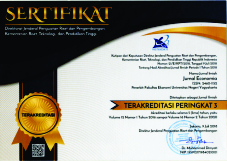The Influence of Motivation and Self-Efficacy Towards The Students' Entrepreneurship Interest in Muhammadiyah University of Palangkaraya
Downloads
Abstract: The students' interest in becoming entrepreneurs is influenced by several factors, such as motivation and self-efficacy. This study aimed to determine the effect of motivation and self-efficacy on students' interest in entrepreneurship at the Muhammadiyah University of Palangkaraya. This research is included in causal associative research. There are three variables in this research, they are entrepreneurial motivation, self-efficacy, and interest in entrepreneurship. The data were taken using a questionnaire. The population of this study was 1635 students, while the sample was 327 students. The researchers used a random sampling technique to choose the sample. This study used multiple regression methods. The results of this study indicated that there was an influence between motivation and self-efficacy on entrepreneurial intentions simultaneously or partially. This study indicated that the motivation variable significantly contributed to entrepreneurial interest than the self-efficacy variable.
Keywords: motivation, self-efficacy, entrepreneurship interest
Pengaruh Motivasi dan Efikasi Diri Terhadap Minat Berwirausaha Mahasiswa Universitas Muhammadiyah Palangkaraya
Abstrak: Ketertarikan untuk menjadi wirausahawan pada mahasiswa dipengaruhi oleh beberapa faktor, diantaranya adalah motivasi dan efikasi diri pada mahasiswa itu sendiri. Tujuan penelitian ini adalah untuk mengetahui pengaruh motivasi dan efikasi diri terhadap minat berwirausaha mahasiswa Universitas Muhammadiyah Palangkaraya. Penelitian ini termasuk dalam penelitian asosiatif kausal. Data dari ketiga variabel (motivasi berwirausaha, efikasi diri dan minat berwirausaha) diambil dengan menggunakan angket. Populasi penelitian ini sebanyak 1635 mahasiswa, sedangkan sampelnya berjumlah 327 mahasiswa. Sampel diambil menggunakan teknik random sampling. Penelitian ini menggunakan metode regresi berganda. Hasil penelitian ini menunjukkan bahwa terdapat pengaruh antara motivasi dan efikasi diri terhadap niat berwirausaha secara simultan maupun parsial. Hasil penelitian ini juga menunjukkan bahwa variabel motivasi memiliki kontribusi terhadap minat berwirausaha yang lebih besar daripada variabel efikasi diri.
Kata kunci: motivasi, efikasi diri, minat berwirausaha
Downloads
Azmi, I. A. G. (2017). Muslim women entrepreneurs motivation in SMEs: a quantitative study in Asia pacific countries. Asian Economic and Financial Review, 7(1), 27. https://doi.org/10.18488/JOURNAL.AEFR%2F2017.7.1%2F102.1.27.42.
Azzahra, S., & Dhewanto, W. (2015). Entrepreneurship training for community in rural area: Motivation and knowledge of entrepreneurship. Advanced Science Letters, 21(6), 1858–1862. https://doi.org/10.1166/asl.2015.6137.
Bandura, A. (2012). On the functional properties of perceived self-efficacy revisited. Sage Publications Sage CA: Los Angeles, CA. https://doi.org/10.1177%2F0149206311410606.
Baumol, W. J., Litan, R. E., & Schramm, C. J. (2007). Sustaining entrepreneurial capitalism. Capitalism and Society, 2(2). https://doi.org/10.2202/1932-0213.1026.
Deci, E. L., & Ryan, R. M. (2000). The" what" and" why" of goal pursuits: Human needs and the self-determination of behavior. Psychological Inquiry, 11(4), 227–268. https://doi.org/10.1207/S15327965PLI1104_01.
Ferreira, J. J., Raposo, M. L., Rodrigues, R. G., Dinis, A., & do Paí§o, A. (2012). A model of entrepreneurial intention: An application of the psychological and behavioral approaches. Journal of Small Business and Enterprise Development. https://doi.org/10.1108/14626001211250144.
Gagné, M., & Deci, E. L. (2005). Self"determination theory and work motivation. Journal of Organizational Behavior, 26(4), 331–362. https://doi.org/10.1002/job.322.
Ghozali, I. (2013). Aplikasi Analisis Multivariate dengan Program IBM SPSS (Edisi Ketujuh). Semarang: Badan Penerbit Universitas Diponegoro.
Hair, J. F., Black, W. C., Babin, B. J., Anderson, R. E., & Tatham, R. L. (2014). Pearson new international edition. In Multivariate data analysis, Seventh Edition. Pearson Education Limited Harlow, Essex.
Herdjiono, I., Puspa, Y. H., Maulany, G., & Aldy, B. E. (2017). The factors affecting entrepreneurship intention. International Journal of Entrepreneurial Knowledge, 5(2), 5–15. http://dspace.vsp.cz/handle/ijek/69.
Howard, J., Gagné, M., Morin, A. J. S., & Van den Broeck, A. (2016). Motivation profiles at work: A self-determination theory approach. Journal of Vocational Behavior, 95, 74–89. https://doi.org/10.1016/j.jvb.2016.07.004.
Locke, E. A., & Latham, G. P. (2004). What should we do about motivation theory? Six recommendations for the twenty-first century. Academy of Management Review, 29(3), 388–403. https://doi.org/10.5465/amr.2004.13670974.
Malebana, M. J. (2014). Entrepreneurial intentions and entrepreneurial motivation of South African rural university students. Journal of Economics and Behavioral Studies, 6(9), 709–726. https://doi.org/10.22610/jebs.v6i9.531.
Maslow, A. H. (1943). A theory of human motivation. Psychological Review, 50(4), 370. https://psycnet.apa.org/doi/10.1037/h0054346.
McGee, J. E., Peterson, M., Mueller, S. L., & Sequeira, J. M. (2009). Entrepreneurial self–efficacy: Refining the measure. Entrepreneurship Theory and Practice, 33(4), 965–988. https://doi.org/10.1111%2Fj.1540-6520.2009.00304.x.
Milyavskaya, M., & Koestner, R. (2011). Psychological needs, motivation, and well-being: A test of self-determination theory across multiple domains. Personality and Individual Differences, 50(3), 387–391. https://doi.org/10.1016/j.paid.2010.10.029.
Raza, S. A., Qazi, W., & Shah, N. (2018). Factors affecting the motivation and intention to become an entrepreneur among business university students. International Journal of Knowledge and Learning, 12(3), 221–241. https://doi.org/10.1504/IJKL.2018.092315.
Romano, A., Passiante, G., Del Vecchio, P., & Secundo, G. (2014). The innovation ecosystem as booster for the innovative entrepreneurship in the smart specialisation strategy. International Journal of Knowledge-Based Development, 5(3), 271–288. https://doi.org/10.1504/IJKBD.2014.065315.
Sartika, N. Y., & Sugiharsono, S. (2020). Self-Efficacy and Intensity of the Use of Social Media on Consumption Behavior: Case Study in the Economics Faculty of Yogyakarta State University. Jurnal Economia, 16(1), 71–85. https://journal.uny.ac.id/index.php/economia/article/view/27067.
Sugiyono. (2013). Metode penelitian pendekatan kualitatif, kuantitatif, dan R & D. Bandung: CV. Alfabeta.
Tumasjan, A., & Braun, R. (2012). In the eye of the beholder: How regulatory focus and self-efficacy interact in influencing opportunity recognition. Journal of Business Venturing, 27(6), 622–636. https://doi.org/10.1016/j.jbusvent.2011.08.001.
Tyszka, T., CieÅ›lik, J., Domurat, A., & Macko, A. (2011). Motivation, self-efficacy, and risk attitudes among entrepreneurs during transition to a market economy. The Journal of Socio-Economics, 40(2), 124–131. https://doi.org/10.1016/j.socec.2011.01.011.
Utari, F. D., & Sukidjo, S. (2020). The Roles of Need for Achievement and Family Environment in Stimulating Entrepreneurial Interest through Self-Efficacy. Jurnal Economia, 16(2), 143–160. https://journal.uny.ac.id/index.php/economia/article/view/28725.
Zimmerman, B. (2009). Self-Efficacy and Educational Development: Self-Efficacy in Changing Societies. New York: W.H. Freeman and Company.















